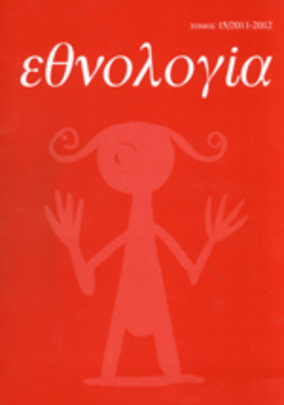Η πρόσληψη της δεύτερης συζύγον ή η στρατηγική της πατρογραμμικής γενιάς στην Ελλάδα
Part of : Εθνολογία : περιοδική έκδοση της Ελληνικής Εταιρείας Εθνολογίας ; Vol.3, No.1, 1994, pages 51-83
Issue:
Pages:
51-83
Parallel Title:
The secondary wife or the strategy of patrilineage in Greece
Author:
Abstract:
In this paper we examine in detail, on a diachronic as well as on a synchronic level, the custom of taking a second wife, in the case that the first one did not have any children or in the case that she had only girls. Special emphasis is laid on the functioning of this institution within the framework of the traditional Greek society.According to our information -which is largely derived from the manuscript collections of the Research Centre for Greek Laography of the Athens Academy and the Study of Laography of the University of Athens, as well as from our personal fieldwork- the custom was widespread in Greece, as we can see in the relevant map. More specifically, we find it in central and western Crete, in central, northern and western Peloponnesus, in central and western Sterea Hellas and in certain areas of Epirus. All data point to the view that the custom is widespread among the nomads and semi-nomads and among sedentary populations originated from them.The primary function of the institution was the maintenance of the patrilineage in the case where no male offspring existed, because in those societies descent from the father and kinship through men was more important than descent from the mother and kinship through women.In this essay, the author presents many examples from his own fieldwork that took place in several regions of mainland Greece (Epirus, Sterea Hellas, Mani). The author infers that the institution was preserved until recently, and it was abandoned when the traditional structures began to disintegrate.In his article, the author also examines the ideological support of the institutions, the social position of the two women and the status within the family and society of the children bom in such marriages. Special attention is paid to the analysis of the relations of the children with the first wife of their father, and the ways of strengthening the bonds of all the members of the family.During the Turkish occupation, in some regions, the second wife would come home after an official matrimonial ceremony. However, after the establishment of an independent Greek State, an official wedding would follow a simulated divorce of the husband from his first wife, having first secured her position giving her some of his property. Some times, the husband was married to his second wife after the death of his first wife. In any case, both women lived together in the same house, sometimes co-operating with no problems, and some times creating serious problems with their quarrels resulting, in some cases, to one of them leaving the house. The contribution of this article lies in identifying and interpreting an important institution of traditional Greek society, which enables us to understand better the mentality and behaviour of the Greek people and culture.
Subject (LC):
Keywords:
Ελλάς
Notes:
Το κείμενο αυτό είναι μετάφραση από τα γαλλικά μελέτης που έχει δημοσιευθεί στο περιοδικό Etudes et Documents Balkaniques et Méditerranéens 16 (1992) 4-20 με τίτλο «L’épouse secondaire ou la stratégie du patrilignage en Grèce»




